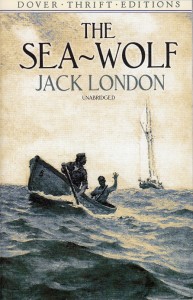Book Review: The Sea-Wolf by Jack London
Today is an ill-omened day. It began with a heavy fog in San Francisco Harbor, and the ferry carrying literary critic Humphrey Van Weyden colliding with another ship. He managed to get into a life jacket, but was swept away from the other survivors by a freak tide that took him out to sea. You’d think that being picked up by a ship would be a good thing, but this is the seal-hunting ship Ghost, and she is commanded by the much feared Wolf Larsen. Captain Larsen has no intentions of returning to harbor, and one of his sailors having just died, presses Van Weyden into service as a cabin boy.
This 1904 novel was partially based on Jack London’s own experience working on a sealing ship, and is considered one of the great sea adventure stories. The primary conflict of the book is the clash of life philosophies between the idealistic gentleman Van Weyden, and the nihilistic and amoral Larsen.
Van Weyden is a nice enough fellow, but in large part that’s because he’s never needed to test that niceness. Having inherited a substantial sum from his father, and cossetted by his female relatives, Humphrey has been able to dedicate himself to his books and writing career. He’s never had to actually work for a living, and the harsh shipboard life comes as a series of shocks to him (even not counting Wolf Larsen’s particular cruelty.) Van Weyden is rather classist, and as we see later in the book, very sexist (in the “positive discrimination” sense.) He grows up in many ways during the course of the story.
But it’s Larsen that the book is named for. Born into abject poverty as a Dane in Norway, he went to sea at the earliest opportunity. He taught himself to read and write and speak English, and all the skills needed of a sailor. No man’s hand was lifted to help him along the way; Larsen clawed every bit of knowledge out for himself. In a harsh world, Wolf Larsen learned to be harsh and rose in the ranks. He took advantage of every opportunity that came his way, and has reached the pinnacle of his career path…captain of a small ship, commanding a score or so of men.
It’s said that Jack London modeled Wolf Larsen on the Nietzchean ubermensch, physically superior to everyone else on the ship, and intellectually superior to everyone except Humphrey (but with a more thought-out life philosophy.) He’s also a perfect specimen of masculine beauty according to Van Weyden. But he is constrained by his circumstances; his genius and drive could have made him a rich man or politically powerful, or a great artist, but life never fell out for him that way. His cruelty and amoral behavior make him absolute master of his ship, but immensely lonely, and those under Wolf will turn against him at any chance they have. In the end his own philosophy of “life eating life to live” is his downfall.
Most of the crew has minimal characterization, but we do get to know a few. Johnson (not “Yonson”) of quiet dignity and great admiration for the shipbuilding craft. George Leach (not his real name) who had to flee San Francisco for crimes unnamed, and with too much courage for his own good. Louis, the consummate survivor. And Thomas “Cooky” Mugridge, Cockney ship’s cook. This last fellow is Van Weyden’s particular enemy early in the book. Mugridge is sniveling to those above him, and tyrannical to those below him, filthy in his habits, greedy and isn’t very good at cooking. He’s an odious person, but as Van Weyden learns, Mugridge is also constrained by his circumstances, plagued with ill luck as well as bad life choices.
Another presence, never directly seen, is Death Larsen, Wolf Larsen’s brother, and by all accounts an even worse person than him. He’s in the same business, but with a bigger boat, and the brothers hate each other even more than they hate everyone else.
The story shifts about two-thirds of the way in with the appearance of more castaways, including Maud Brewster. This moderately successful poet was on a voyage to Japan to improve her health when a storm wrecked her ship. Fancy her landing on the same ship as the literary critic who boosted her early career! She and Van Weyden quickly become friends, and in different circumstances, it could be more. But Wolf Larsen also finds himself attracted to Maud’s beauty and wit, and he is bound by neither politeness nor custom of courtship.
It becomes necessary for Maud and Humphrey to flee the ship, and after some days in a small boat, manage to find a deserted island. They set their minds and bodies to survive the coming winter…but the couple hasn’t seen the last of Wolf Larsen. The romance is easily the weakest part of the book, and was considered cheesy even by contemporary critics, but does provide something of a happy ending.
There’s quite a bit of violence in the book, both human-on-human and human-on-seal. The latter will be even more appalling to modern readers than early Twentieth Century ones, I think. Van Weyden notes the wastefulness of killing these creatures for their skins, and then just dumping the remainder of the corpses. There’s torture that goes a bit further than intended, and a near-sexual assault that’s only averted by coincidence.
On the other hand, no one in the book excretes waste, (really obvious during the small boat escape) and no one ever has sex. (The crew of the ship is explicitly celibate.) There’s a kiss at the end, but that’s it for physical contact.
Overall, an exciting tale of adventure and philosophy, but the romance takes the book down a notch. Recommended for fans of sea tales and people who enjoy Jack London’s other books.

